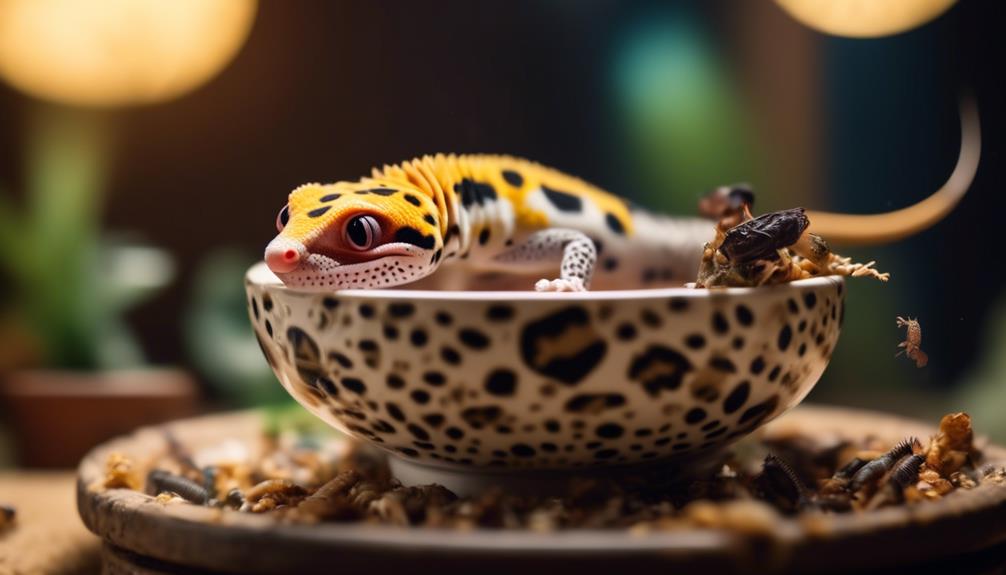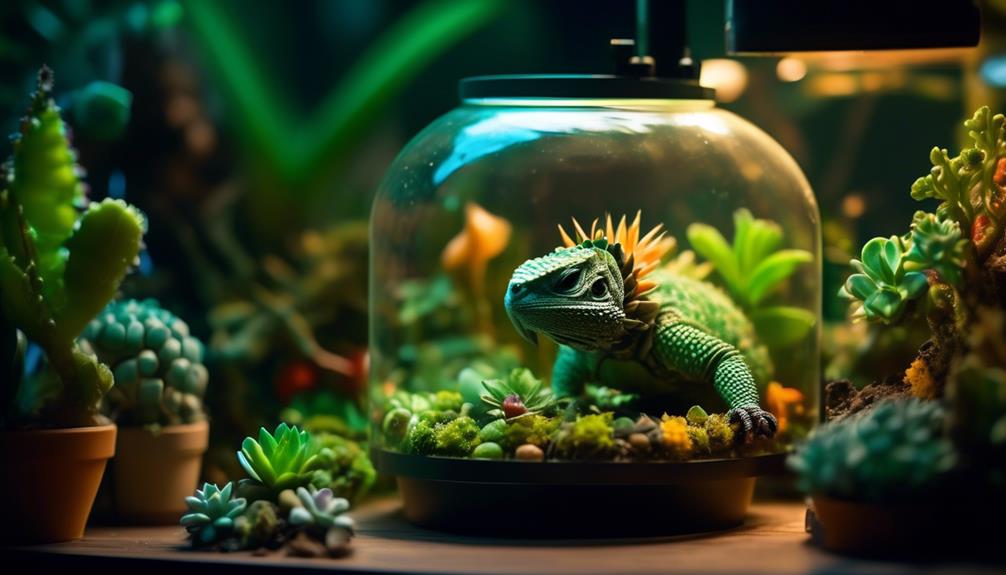Did you know that leopard geckos are one of the most popular reptile pets in the world, with over 1 million households in the United States alone owning one?
If you're one of those proud gecko owners or simply fascinated by these unique creatures, you won't want to miss this discussion on the surprising truth about their diet. Contrary to popular belief, there is more to feeding leopard geckos than meets the eye.
We will uncover the hidden secrets behind their nutritional needs and reveal why a well-balanced diet is crucial for their overall health. So, if you're curious to discover what these magnificent creatures truly require to thrive, keep reading – you won't be disappointed!
Key Takeaways
- Leopard geckos require a varied diet of live insects such as crickets, mealworms, and waxworms, which should be gut-loaded.
- Calcium and vitamin D3 supplementation is crucial to prevent metabolic bone disease in leopard geckos.
- Adult geckos only require feeding every other day, while younger geckos may need daily feeding.
- Providing a balanced and nutrient-rich diet is crucial for the overall health and well-being of leopard geckos.
Leopard Gecko Diet Basics
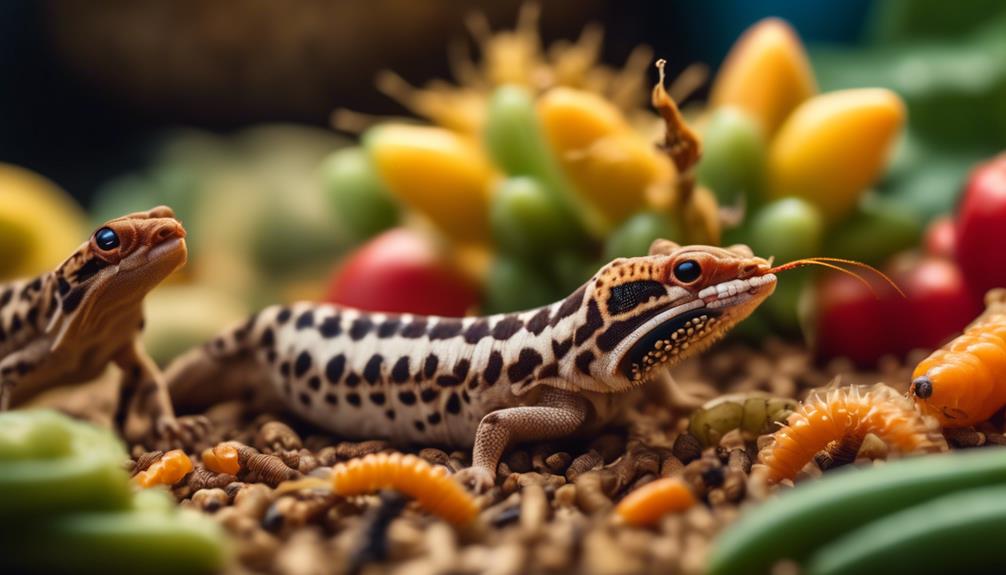
Leopard gecko diet basics include understanding the appropriate types and quantities of food that these reptiles require for proper nutrition. When it comes to their feeding schedule, leopard geckos are nocturnal hunters, so they prefer to eat during the evening and early morning hours.
It's important to provide them with a varied diet that consists of live insects such as crickets, mealworms, and waxworms. These insects should be gut-loaded, meaning they've been fed a nutritious diet before being offered to the geckos.
Additionally, leopard geckos require calcium and vitamin D3 supplementation to prevent metabolic bone disease. It's crucial to provide them with a shallow dish of calcium powder and a UVB light source to ensure they're meeting their nutritional requirements.
Following these guidelines will help maintain the health and well-being of your leopard gecko.
Common Misconceptions About Leopard Gecko Diet
There are several common misconceptions about the diet of leopard geckos that need to be addressed in order to ensure their proper nutrition. It's important to debunk these myths and provide accurate information for leopard gecko owners.
- Myth: Leopard geckos can survive on a diet of only insects.
Fact: While insects are a crucial part of their diet, leopard geckos also require other nutrients such as calcium and vitamins. It's important to supplement their diet with calcium powder and provide them with a variety of insects.
- Myth: Leopard geckos can eat any type of insect.
Fact: Leopard geckos should only be fed insects that are safe for them to consume, such as crickets, mealworms, and dubia roaches. Other insects may be harmful or difficult for them to digest.
- Myth: Leopard geckos need to be fed every day.
Fact: Adult leopard geckos only require feeding every other day, while younger geckos may need to be fed daily. Overfeeding can lead to obesity and other health issues, so it's important to adhere to a proper feeding schedule.
The Impact of Diet on Leopard Gecko Health
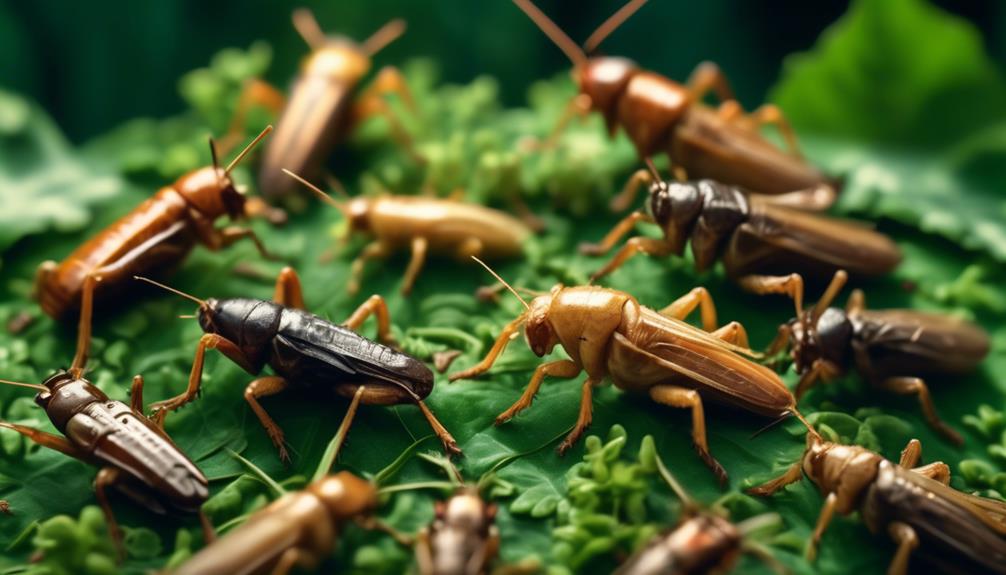
The diet of leopard geckos directly impacts their overall health and well-being, making it crucial to provide them with a balanced and nutrient-rich meal plan. Nutrition plays a vital role in the overall well-being of leopard geckos.
A proper diet ensures that these reptiles receive the necessary vitamins, minerals, and nutrients to support their growth, reproduction, and immune function. An improper diet can have detrimental effects on leopard gecko health.
For instance, a diet lacking in essential nutrients can lead to stunted growth, weakened immune system, and reproductive issues. Similarly, an excess of certain nutrients, such as vitamin D3, can result in metabolic bone disease.
Therefore, it's imperative to provide leopard geckos with a diet that meets their nutritional needs to ensure their overall health and well-being.
Surprising Facts About Leopard Gecko Food Preferences
Have you ever wondered about the surprising food preferences of leopard geckos? These fascinating creatures have some unusual food choices that may surprise you.
Here are three surprising facts about leopard gecko food preferences:
- Insects are their main source of nutrition: Leopard geckos are insectivores, meaning they primarily eat insects like crickets, mealworms, and waxworms. These insects provide essential nutrients such as protein and calcium, which are crucial for their growth and overall health.
- They also eat small vertebrates: While insects make up the majority of their diet, leopard geckos may also consume small vertebrates like baby mice or geckos. This behavior is more commonly observed in wild leopard geckos, but some captive individuals may exhibit this feeding habit as well.
- They've a sweet tooth: Despite being primarily insectivorous, leopard geckos also enjoy the occasional sweet treat. They've been known to eat fruit, such as mashed bananas or small pieces of melon, as a special treat. However, it's important to note that fruits should only be given in moderation, as they can be high in sugar.
Understanding these leopard gecko feeding habits and their unusual food choices can help us provide a balanced and nutritious diet for these amazing creatures.
Best Practices for Feeding Leopard Geckos
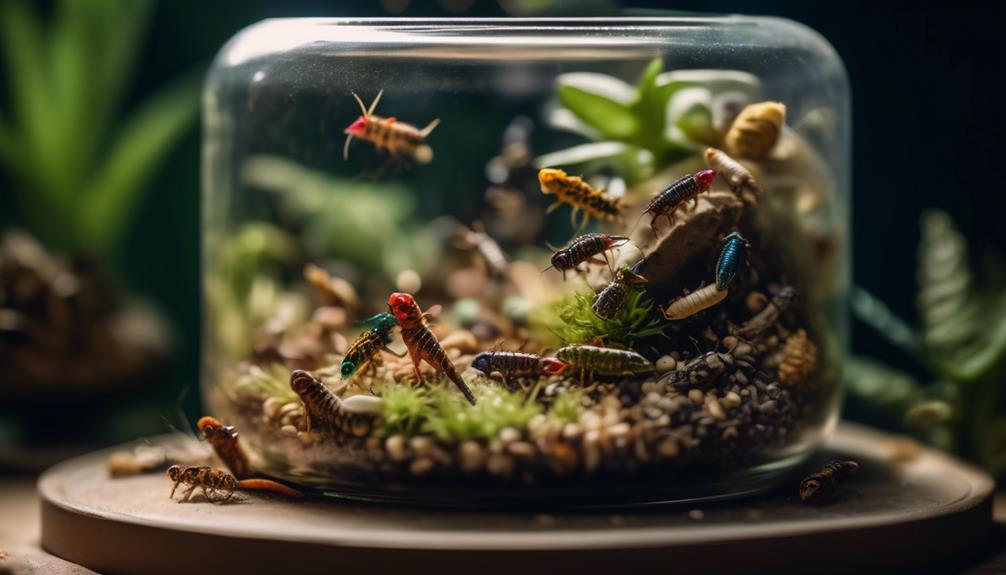
Leopard geckos' unique food preferences lead us to explore the best practices for feeding these fascinating creatures. When it comes to feeding leopard geckos, it is important to establish a regular feeding schedule to ensure their nutritional needs are met. Providing a variety of food sources is crucial for a well-rounded diet. Here is a table outlining the recommended feeding schedule and food sources for leopard geckos:
| Time of Day | Food Sources |
|---|---|
| Evening | Live insects (crickets, mealworms, dubia roaches) |
| Every other day | Calcium and vitamin D3 powder sprinkled on insects |
| Twice a week | Gut-loaded insects (insects fed with nutritious food) |
| Once a week | Waxworms or other treat insects |
| Monthly | Dust insects with a multivitamin supplement |
Following this feeding schedule ensures that leopard geckos receive the necessary nutrients for their overall health and well-being. It is crucial to provide a balanced diet that incorporates a variety of live insects and supplements to support their growth and vitality.
Frequently Asked Questions
Can Leopard Geckos Eat Fruits and Vegetables as Part of Their Diet?
Yes, leopard geckos can eat fruits and vegetables as part of their diet. However, it's important to note that their digestive system is designed for a primarily insect-based diet due to their specific nutritional needs.
What Is the Recommended Feeding Schedule for Leopard Geckos?
The recommended feeding schedule for leopard geckos includes a variety of insects such as crickets and mealworms. While fruits and vegetables are not necessary, they can provide additional nutrients and hydration.
Are There Any Specific Food Items That Leopard Geckos Should Avoid?
We should definitely be careful about the food we give to leopard geckos. There are certain food items that they should avoid as they can pose potential health risks.
Can Leopard Geckos Be Fed Live Insects Exclusively, or Do They Require Additional Supplements?
Leopard geckos can survive on a diet of live insects alone, but additional supplements are necessary for their optimal health. These supplements provide essential nutrients and help prevent nutritional deficiencies.
How Often Should Calcium and Vitamin Supplements Be Provided to Leopard Geckos?
We should provide calcium and vitamin supplements to leopard geckos at appropriate frequencies to ensure their health. However, excessive supplementation can pose risks. It is important to strike a balance to avoid over supplementing.
Conclusion
In conclusion, understanding the dietary needs of leopard geckos is crucial for their overall health and wellbeing. Contrary to common misconceptions, these reptiles require a well-balanced and nutritious meal plan to thrive.
An interesting statistic to note is that leopard geckos have been observed to prefer live insects, with studies showing that they consume an average of 10-15 insects per week.
By providing a proper diet and following best practices for feeding, you can ensure the longevity and vitality of your scaly friend.
